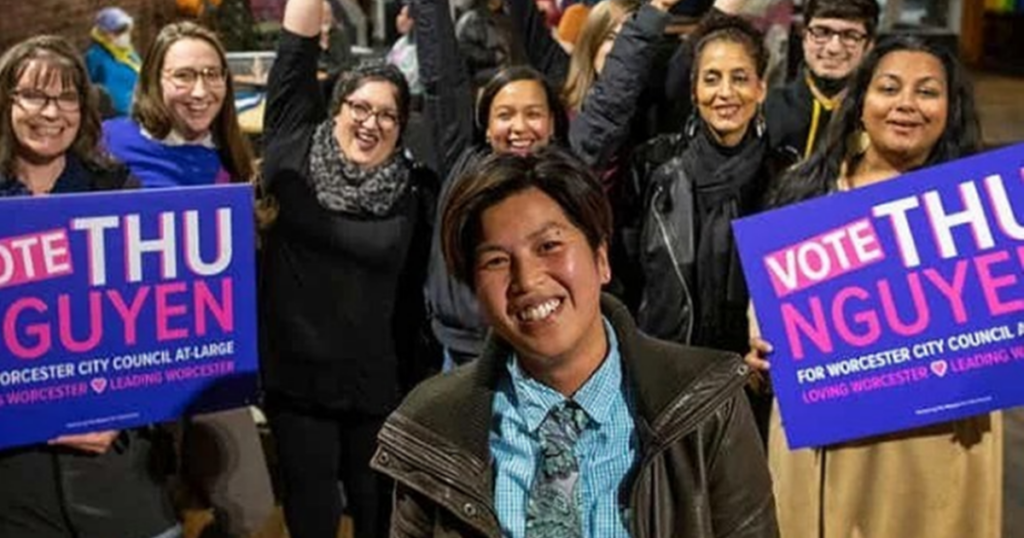
Nonbinary Candidates Make History
Tuesday's elections produced multiple victories for LGBTQ candidates in local elections across the nation, including historic wins for nonbinary election candidates.
Thu Nguyen became the first nonbinary person ever elected to office in the state of Massachusetts. They claimed a seat on the Worchester City Council with a fourth place finish, garnering 10% of the vote. According to the Washington Blade, Nguyen, a Vietnamese refugee, is best known for their work with the Southeast Asian Coalition, which aids communities through small business support, advocacy and addressing food insecurity.
Xander Orenstein also made history, becoming the first nonbinary candidate ever elected to a judicial position in the nation's history. They ran unopposed in the Allegheny County Magisterial District Court race in Pennsylvania after narrowly defeating the incumbent in a May primary.
Nguyen and Orenstein's victories bring the total of out nonbinary elected officials in the U.S. to 11. “Their victory proves voters look beyond gender identity and will elect leaders with the qualifications and drive to improve people's lives,” said LGBTQ Victory Fund CEO Annise Parker.
Federal Judge Approves Of Religious Businesses' LGBTQ Discrimination
A ruling from a federal judge in Texas cleared the way for businesses with “sincerely held religious beliefs” to discriminate against LGBTQ employees despite a Supreme Court ruling that preserved LGBTQ civil rights protections.
U.S. District Judge Reed O'Conner issued the ruling Sunday, claiming that the Religious Freedom Restoration Act and the First Amendment granted religious businesses exemption from the protections extended to LGBTQ people under Title VII of the Civil Rights Act of 1964. According to the Dallas Morning News, the decision covers both for-profit and nonprofit organizations.
The ruling comes as Christian health care company Braidwood Management and Bear Creek Bible Church filed suit against the U.S. Equal Employment Opportunity Commission challenging the protections established by the Supreme Court's ruling in Bostock v. Clayton County last year. Braidwood doesn't provide employee benefits to workers in same-sex relationships and doesn't recognize same-sex marriages, a policy that conflicts with the Bostock ruling.
O'Conner's undermining of the Bostock decision now paves the way for religious business owners to fire LGBTQ employees simply for their identity, refuse to hire LGBTQ applicants based on their sexual orientation or gender identity and withhold employee benefits for LGBTQ workers by claiming their existence goes against their religious views.
Michigan Supreme Court Nixes LGBTQ Anti-Discrimination Initiative
A push to extend Michigan's civil rights law to include protections for LGBTQ communities is dead after the Michigan Supreme Court declined to offer an opinion on a dispute between organizers and state officials regarding petition signatures.
Advocacy group Fair and Equal Michigan asked the court to weigh in after the state's Board of State Canvassers declined to certify the organization's petition on the basis that it didn't meet the required amount of signatures. According to the Detroit Metro Times, the Michigan Bureau of Elections rejected the group's petition in July claiming that its 299,000 signatures fell short of requirements by about 40,000 signatures. Fair and Equal Michigan accused the elections bureau of invalidating legitimate signatures that brought them below requirements.
“After 38 years of lawmakers ignoring us, we set out to collect and leverage citizen signatures to compel lawmakers to finally come to the table and negotiate – and for that we succeeded,” said Trevor Thomas, Fair and Equal Michigan co-chair.
Despite the defeat, there is another case set for arguments at the Michigan Supreme Court where Attorney General Dana Nessel will argue for civil rights protections based on sexual orientation. “While we are disappointed that the court won't act to recognize legally-valid signatures thrown out by the state, it's clear the best opportunity to achieve LGBTQ equal rights in Michigan is to place full focus on Attorney General Dana Nessel's historic case currently before the Michigan Supreme Court,” said Thomas.



